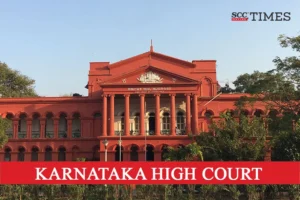Karnataka High Court: While considering the instant petition challenging the registration of crime against persons accused of creating communal disturbances by shouting ‘Jai Shri Ram’ inside a mosque, the Bench of M. Nagaprasanna, J*., found no ingredients of any of the offences so alleged under Sections 295-A, 505 and 506 and 447 of Penal Code, 1860, in the complaint and held that permitting further proceedings against the accused persons would become an abuse of the process of law and result in miscarriage of justice.
Background and Contentions:
On the night of 24-09-2023 some unknown persons entered a mosque and shouted the slogan ‘Jai Shri Ram’ and said to have threatened that they will not leave the community and thereafter ran away from the spot.
Subsequently, a complaint was filed against unknown persons on 25-09-2023 alleging that the persons were trying to create communal rift between the Hindus and Muslims of the area under the jurisdiction of Kadaba Police Station, Puttur Circle. While conducting investigation, the Police apprehended the petitioners, who were then drawn as accused persons in the case.
The petitioners’ counsel argued that none of the ingredients of Sections 295-A, 505 and 506 and 447 of IPC are present in the instant case. It was submitted that the offence under Section 447 of the IPC deals with criminal trespass; since a Masjid is a public place, entry into it cannot mean a criminal trespass.
Per contra, the State argued that the petitioners cannot enter the Masjid and shout ‘Jai Sriram’ or threaten the Muthavalli. The matter therefore requires investigation in the least.
Court’s Assessment:
Perusing the facts of the case and the complaint against the petitioners, the Court took note of the IPC provisions stated in the complaint.
Examining Section 295-A, IPC which deals with deliberate and malicious acts intended to outrage religious feelings of any class by insulting its religion or religious beliefs, the Court expressed its confusion as to how if someone shouts ‘Jai Sriram’ it would outrage the religious feeling of any class. “When the complainant himself states that Hindu — Muslims are living in harmony in the area the incident by no stretch of imagination can result in antimony”.
The Court relied on Mahendra Singh Dhoni v. Yerraguntla Shyamsundar, (2017) 7 SCC 760, wherein the Supreme Court had held that any and every act will not become an offence under Section 295-A of IPC. The acts that have no effect on bringing out peace or destruction of public order will not lead to an offence under Section 295-A of the IPC.
Further moving onto the ingredients of Sections 505 and 506, IPC, the Court pointed out that the complaint itself narrated that the complainant did not even seen who was the one who is alleged to have committed offence of criminal intimidation attracting ingredients of Section 506 of the IPC. Furthermore, the Court pointed out that the complaint nowhere even remotely touched upon the ingredients of Section 503 or Section 447 of the IPC.
Therefore, with the afore-stated perusal, the Court deemed it fit to quash the entire proceedings against the petitioners pending before the II Additional Civil Judge & JMFC, Puttur, Dakshina Kannada.
[Keerthan Kumar v. State of Karnataka, 2024 SCC OnLine Kar 108, decided on 13-9-2024]
*Order by Justice M. Nagaprasanna
Advocates who appeared in this case :
Petitioner: B.S. Sachin, Adv
Respondents: R. Sowmya, High Court Government Pleader for R 1


